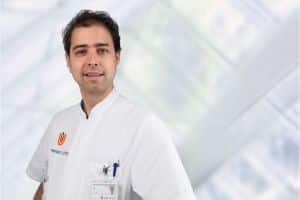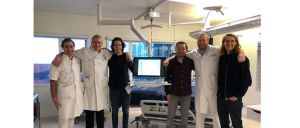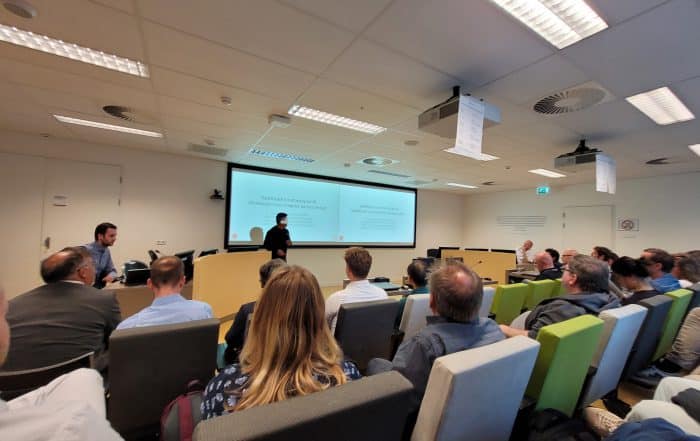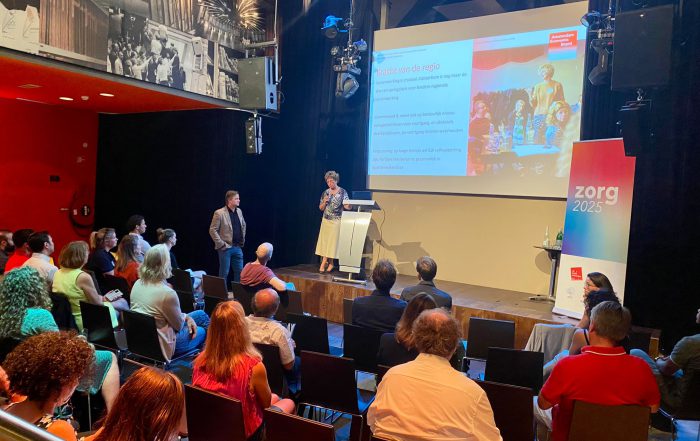AI-innovatie kan levens redden op de IC
Intensive-care geneeskunde is een gebied waar veel op het spel staat. Elke dag worden er meerdere beslissingen genomen die letterlijk het verschil tussen leven en dood kunnen betekenen. Een van die beslissingen is of een patiënt gezond genoeg is om van de IC te worden ontslagen. Artsen van het Amsterdam UMC krijgen nu ondersteuning van kunstmatige intelligentie bij die beslissing. Wouter Kroese (Pacmed) en Patrick Thoral (UMC) vertellen over de samenwerking die leidde tot deze baanbrekende wereldprimeur.
De beste keuzes maken
Een patiënt ontslaan van de Intensive Care Unit is riskant. Als de toestand verslechtert, kan terugkeer naar de IC noodzakelijk zijn. Wanneer dit gebeurt, is de kans op overlijden groter dan wanneer de patiënt op de IC was gebleven. Maar patiënten langer op de intensive care houden dan nodig, is ook ongewenst: het blokkeert schaarse bedden, die nodig zijn voor anderen. Bovendien is een onnodig lang verblijf op de IC ongezond en traumatiserend voor patiënten.
De onlangs gelanceerde software Pacmed Critical vergelijkt de informatie van een IC-patiënt met de data van bijna 25.000 eerdere IC-patiënten. Op basis hiervan maakt de software een voorspelling van de gecombineerde kans op heropname en ongewenst overlijden binnen een week na ontslag. Het geeft ook een overzicht van de factoren waarop die voorspelling is gebaseerd en laat zien hoe die voorspelling met de tijd verandert. Het is het resultaat van een langdurige samenwerking tussen Patrick Thoral, zijn collega-intensivist Paul Elbers en de Amsterdamse softwareontwikkelaar Pacmed.
Gedeelde visie op data science
Over de samenwerking met Amsterdam UMC zegt Pacmed medeoprichter en co-CEO Wouter Kroese dat Pacmed al vroeg het potentieel zag van het gebruik van data om de klinische praktijk te verbeteren. “Amsterdam UMC was een van de allereersten die gebruik maakten van de enorme hoeveelheden data die op de IC worden gebruikt.”
Pacmed begon met softwareontwikkeling in de eerstelijnszorg en breidde vijf of zes jaar geleden uit naar IC-oplossingen, na gesprekken met Thoral en Elbers. Het bedrijf breidde ook uit naar andere gezondheidszorggebieden, maar besloot een jaar geleden zich volledig te richten op de IC. “We voelen ons zo goed verbonden met Amsterdam UMC,” zegt Kroese. “Het was voor ons echt inspirerend om te praten met artsen die zo goed weten wat je met data kunt doen, en die in een vakgebied zitten waar zoveel data is. Het voelde helemaal niet commercieel, we waren echt gericht op het maken van een verandering.”
Thoral legt uit dat het UMC geïnteresseerd was in manieren om optimaal gebruik te maken van IC-data. Hij had contact gelegd met grote bedrijven als Microsoft en IBM om de mogelijkheden te bespreken, maar veel vooruitgang was er niet geboekt. “Vertegenwoordigers van die organisaties wisten helemaal niet wat er nodig is om daadwerkelijk iets zinnigs met die data te doen,” zegt Thoral. “Het was echt verfrissend om met de jongens van Pacmed te praten. Ze hebben kennis over de medische aspecten, maar ook over de data zelf.”

Wouter Kroese
Hindernissen overwinnen
Pacmed Critical was vijf jaar in ontwikkeling. Op de vraag wat de doorbraak mogelijk maakte, antwoordt Thoral eenvoudigweg: doorzettingsvermogen. “In het begin beseften de meesten van ons niet wat nodig was om de software in de praktijk te kunnen gebruiken: de technische en wettelijke hindernissen. Beide partijen wisten hoe nuttig het kon zijn en bleven met iedereen praten, zowel binnen als buiten het ziekenhuis, om tot een eindproduct te komen dat de resultaten voor de patiënt daadwerkelijk zou kunnen veranderen.” Kroese is het daarmee eens en voegt eraan toe dat de IC-zorg “verreweg het meest haalbare en invloedrijke deel van de gezondheidszorg” is voor beslissingsondersteunende software op basis van klinische data.
Het creëren van het Pacmed Critical-algoritme – wat Kroese beschrijft als de ‘kernintelligentie van de software’ – was het uitgangspunt. Vervolgens werd het gevalideerd met data van en gebruikerstests in Amsterdam UMC en andere ziekenhuizen. Het onderzoek gaat door, zegt Thoral. “Eerst vroegen we artsen om hun voorspellingen vooraf te geven, om te zien hoe die overeenkwamen met de voorspellingen van het model. Nu zijn we in de fase waarin ze de software daadwerkelijk gebruiken om te zien hoe het hun beslissing ondersteunt. We zien dat het artsen helpt.”
AI-gesprekken
Thoral zegt dat het proces interessant is vanuit zowel technisch als sociologisch perspectief, omdat medische professionals “gedwongen worden data te gebruiken bij de beslissing over een specifieke patiënt. Dat leidt tot interactie en discussies, vooral als de voorspellingen van de artsen verschillen van de software.” Hij ziet die discussies als een positief en logisch onderdeel van de werking van een ICU. “We hebben altijd dingen besproken met onze collega’s, met verpleegkundigen, met andere zorgverleners, en nu laten we AI de discussie verder aanwakkeren. Ik denk dat dat goed is, want het vraagt het hele team om zaken opnieuw te evalueren als de software iets anders ziet, en soms veranderen we van mening.”
Duidelijke, specifieke richtlijnen
Data delen tussen organisaties is essentieel voor de ontwikkeling van AI-software zoals Pacmed Critical. Thoral vindt dat er ethisch gezien veel mogelijk is binnen de AVG-regelgeving, maar dat ziekenhuizen duidelijkere richtlijnen nodig hebben. “Er is nu geen gestandaardiseerde manier om te weten of je aan de eisen voldoet. Je hebt discussies met je privacy officers en je ethische comités en dat is natuurlijk goed, dat moet gebeuren, maar het kost tijd. Vooral in het begin waren er niet veel richtsnoeren voor best practices om data te delen. Het probleem is niet de wet zelf, maar de moeilijkheid om iedereen op één lijn te krijgen over de interpretatie van de wet.”
De Nederlandse gezondheidszorg neemt stappen om data delen aan te moedigen, net als andere Europese instellingen, maar er zijn hindernissen. Sommige organisaties aarzelen om mee te doen. “Ze zien het als het ‘weggeven’ van je data”, zegt Thoral. “Data die je als instelling zou kunnen gebruiken voor eigen onderzoek, geef je weg aan andere instellingen. Ook vereist data delen menselijke en financiële middelen, en niet elke instelling heeft de mensen die dat voor elkaar kunnen krijgen.”

Patrick Thoral
Vertrouwen opbouwen
Kroese is net zo overtuigd van het belang van data-uitwisseling voor innovatie in de gezondheidszorg, maar laat ook een waarschuwend geluid horen. “Ik zie veel ethische risico’s in algoritmen die worden ontwikkeld zonder dat duidelijk is hoe de data zijn ontstaan, en zonder dat zeker is dat ze op de juiste manier worden verwerkt. Ik denk dat de noodzakelijke professionele technische expertise soms ontbreekt, vooral bij het maken van producten uit data in ziekenhuizen zelf. Het is heel belangrijk dat je duidelijk begrijpt wat de klinische context was en waar er mogelijk fouten of gaten in de gegevens zitten.” Het delen van data moet niet alleen betekenen dat de poorten worden opengezet, zegt Kroese. “Er zijn risico’s verbonden aan onethische toepassingen of toepassingen die niet veilig en geldig zijn. Strenge eisen zijn nodig om het vertrouwen op te bouwen dat je goed met de data omgaat, zowel technisch als vanuit het oogpunt van veiligheid.”
Ken de context
Voor slimme gezondheidsstartups, die willen samenwerken met een gevestigde medische instelling, benadrukt Kroese de noodzaak van een glasheldere focus op wat je probeert te bereiken, en een bewustzijn van alle ‘niet-AI’ elementen die erbij betrokken zijn. Thoral wijst erop dat een van de problemen voor starters is dat op veel softwaresystemen van ziekenhuizen eigendomsrecht rust. Hierdoor is de enige manier om toegang te krijgen tot de benodigde informatie: praten met ziekenhuispersoneel. Kennis van de klinische context is hiervoor essentieel. “Ik heb over veel bedrijven gehoord die interessante ideeën hadden,” zegt hij, “maar als je goed kijkt, zijn ze niet haalbaar vanwege de manier waarop we werken. Iets werkt misschien in de labsituatie, maar niet in de klinische praktijk. Je kunt niet verwachten dat mensen hun werk helemaal anders gaan doen om een AI-model te benutten.”
Vrienden maken en mensen beïnvloeden
Een sterk partnerschap met medische professionals is niet alleen belangrijk om de klinische context te begrijpen, zegt Kroese, maar ook om de stap naar implementatie te zetten. “Je hebt zoveel belanghebbenden op zoveel niveaus nodig in het ziekenhuis. Het is echt nuttig om pioniers te hebben die je helpen navigeren in dit complexe medische veld.” Volgens Kroese zijn er een paar eenvoudige, maar essentiële dingen nodig voor het onderhouden van die partnerschappen. “Wees heel eerlijk en neem geen shortcuts. Toen we begonnen, deed onze marketing het tegenovergestelde van wat de meeste bedrijven zouden doen. We zeiden niet: ‘Dit is de toekomst van alles. En dit is zo cool. En we kunnen dit snel doen en het wordt geweldig’. We waren heel eerlijk dat AI-technologie nog een lange weg te gaan heeft, en dat je algoritmes niet vanaf het begin perfect zullen zijn. Ik denk dat dat ons enorm heeft geholpen bij het opbouwen van het vertrouwen en de positie die we nu hebben.”
Thoral is het daarmee eens. “Je moet met artsen kunnen praten en eerlijk zijn over wat je verwacht, zodat mensen geen verkeerde ideeën krijgen over wat haalbaar is. Anders werkt het averechts als iets niet mogelijk blijkt te zijn… Het is prima om optimistisch te zijn en het potentieel van je idee te laten zien, maar het moet een soort realistische basis hebben in wat je weet over ziekenhuizen en hoe we de gegevens verzamelen.”

Interdisciplinariteit stimuleren
Thoral en Kroese zijn het erover eens dat de interdisciplinaire aanpak die binnen het ecosysteem van ons initiatief Smart Health Amsterdam wordt gestimuleerd, een belangrijke bijdrage levert aan samenwerking en innovatie in de biowetenschappen en de gezondheidszorg. “Bedrijven en hun partners moeten zich kunnen richten op het uitzoeken van de AI, het oplossen van het klinische probleem en het gebruik van de gegevens”, zegt Kroese. “Alle andere dingen daaromheen zijn eigenlijk het lastige deel, en veel bedrijven of projecten lopen tegen dezelfde problemen aan. Het delen van kennis en best practices kan ontwikkelingen dus enorm versnellen.” Het verbinden van verschillende expertisegebieden – “artsen, geneesheren, verpleegkundigen met datawetenschappers” – is cruciaal, voegt Thoral toe. “Het is belangrijk om de verwachtingen op elkaar af te stemmen. Wat heb je van beide kanten nodig om iets zinvols uit je data te halen? Door deze verbanden te leggen, kun je de ontwikkeling van AI-modellen versnellen en ze geïmplementeerd krijgen.”
Lees meer over de AI-gestuurde innovaties van Pacmed in de gezondheidszorg. Amsterdam UMC is een van de partners van Smart Health Amsterdam.
Smart Health Amsterdam is het netwerk voor data- en AI-gedreven innovatie in de Amsterdamse Life Sciences & Health-sector.
13 oktober 2022
Meer weten over
Neem contact op
Blijf jij ook op de hoogte?
8x per jaar nieuws en events uit de regio: schrijf je in voor de Board Update nieuwsbrief
Deel dit artikel
Wil je op de hoogte blijven?
Volg ons dagelijks op LinkedIn en schrijf je in voor de Board Update nieuwsbrief.
Lees ook deze berichten
- Met de selectie van vier kanshebbers is de regionale voorronde van de ...
- Met meer dan 80 ondernemers, 40 investeerders en diverse dienstverleners bood LSH Capital Match ...
- In tijden van geopolitieke spanningen, technologische revoluties en politieke onzekerheden is het ...




